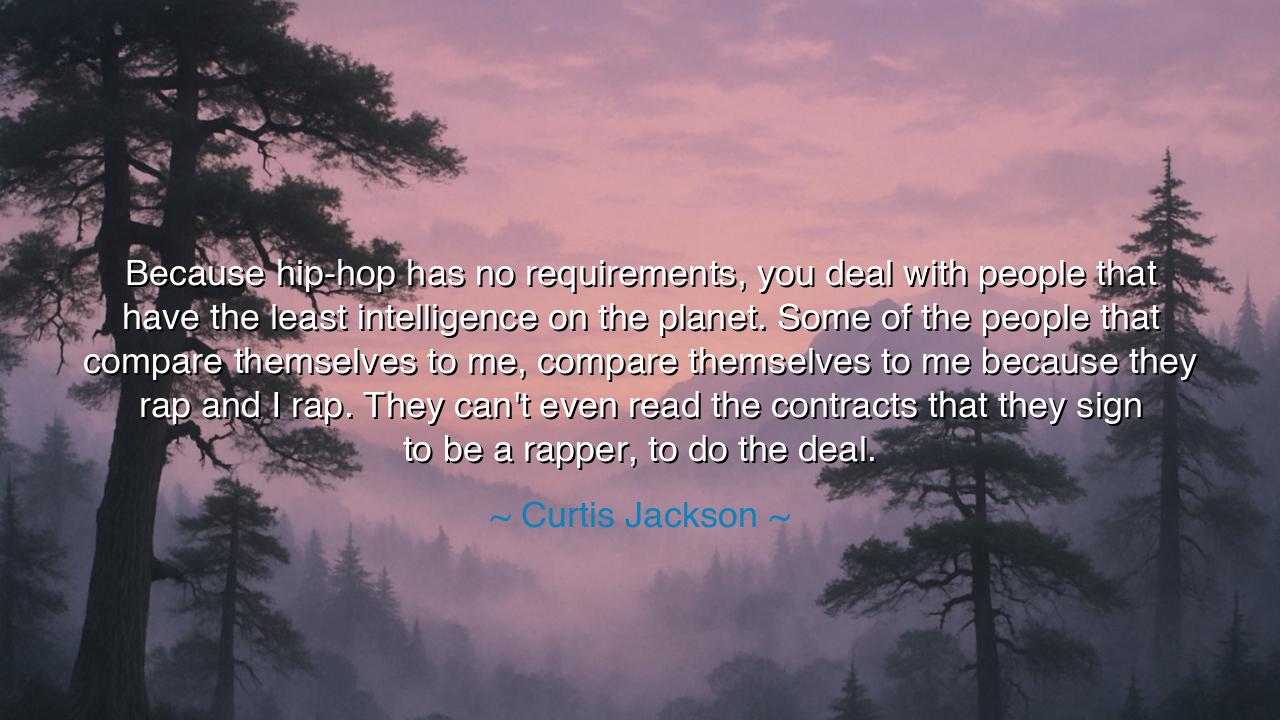
Because hip-hop has no requirements, you deal with people that
Because hip-hop has no requirements, you deal with people that have the least intelligence on the planet. Some of the people that compare themselves to me, compare themselves to me because they rap and I rap. They can't even read the contracts that they sign to be a rapper, to do the deal.






The words of Curtis Jackson, known to the world as 50 Cent, strike with the sharpness of truth carved from hard experience: “Because hip-hop has no requirements, you deal with people that have the least intelligence on the planet. Some of the people that compare themselves to me, compare themselves to me because they rap and I rap. They can’t even read the contracts that they sign to be a rapper, to do the deal.” At first glance, these words may seem harsh, but within them burns the fire of wisdom — the cry of a man who rose from the chaos of the streets to the order of mastery. In his voice we hear not contempt, but clarity. He speaks of discipline, of the necessity of understanding, and of the difference between talent and wisdom. For to create is one thing, but to own what you create — that is true power.
The origin of this statement lies in Jackson’s own journey — a story forged in struggle, ambition, and self-education. Born into hardship, he learned early that survival demanded more than skill; it required knowledge. The streets taught him toughness, but business taught him power. When he entered the world of hip-hop, he saw that many who shared the microphone with him lacked understanding of the world behind the stage — the realm of contracts, ownership, and negotiation. They mistook fame for freedom, and applause for authority. Thus, Jackson’s words are not a condemnation of his peers, but a warning to all who confuse artistry with intelligence, and opportunity with ownership.
When he says that “hip-hop has no requirements,” he speaks to a profound truth about the modern world: that in some arenas, raw talent can bring a man fortune before wisdom has taught him how to wield it. In ancient times, a warrior trained for years before stepping into battle; a philosopher studied under masters before daring to teach; a craftsman served as apprentice before becoming master. But in the age of instant fame, the gate is wide and unguarded. Many enter, few endure. Jackson’s lament is that the ease of entry breeds ignorance — that success without preparation leaves a man vulnerable, especially in a world driven by contracts and commerce. Those who cannot read the words that bind them become slaves to the very system they think they have conquered.
There is a deep historical echo here. Consider the tale of the Trojan Horse, when the people of Troy accepted a gift they did not understand. They celebrated victory without wisdom, and that ignorance destroyed them. So too, many artists today accept deals they cannot interpret, mistaking the glitter of a contract for the gold of freedom. But as Jackson warns, to sign without comprehension is to surrender your future. The ignorance of the contract becomes the modern version of the wooden horse — beautiful to look upon, but filled with silent ruin.
Yet Jackson’s message is not one of despair, but of empowerment. For when he speaks of the “least intelligence,” he does not speak of inherent worth, but of untapped potential. Intelligence, he implies, is not a gift but a discipline — something cultivated through learning, reading, and questioning. The difference between those who perish in the industry and those who prosper is not talent, but understanding. This is why Jackson himself, once known only as a rapper, became a businessman, a producer, and an investor. He mastered the art of reading what others ignored — the fine print of destiny. In doing so, he became what the ancients called a man of both sword and scroll — one who wields both strength and wisdom.
From his words, we see the eternal pattern: those who know only the art fall prey to those who know the system. It was so in the time of artists in the Renaissance, whose works enriched kings while they themselves died poor. It was so in the time of black musicians in early America, whose songs were stolen by the corporations that printed them. And it remains so today. Jackson’s insight is the cry of history repeating itself — a call for the artist to awaken, to study not only how to perform, but how to protect. To understand money, law, and self-worth is not greed; it is survival.
So, my children, let this be your lesson: never allow your passion to outrun your wisdom. Whatever your craft — music, art, business, or dream — seek to understand the world that surrounds it. Learn not only how to create, but how to command. Read the words that others skip, question the terms that others accept, and know the value of your work before you sell it. Ignorance is the chain; knowledge is the key.
For Curtis Jackson’s wisdom is the voice of a man who learned through pain that freedom belongs to the informed. Talent may open doors, but understanding keeps them open. Be vigorous in learning, relentless in thinking, and humble in mastery. For the world is full of voices, but few of them truly know what they say. Be among the few — the wise, the awake, the ones who not only make history, but own it.






AAdministratorAdministrator
Welcome, honored guests. Please leave a comment, we will respond soon